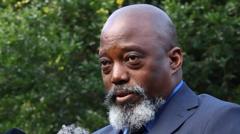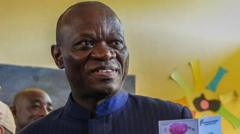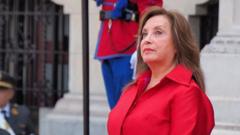President Yoon Suk Yeol of South Korea apologized for causing "anxiety and discomfort" due to his martial law declaration, as lawmakers prepare for a crucial impeachment vote. His emotional address failed to quell dissatisfaction from opposition figures, who argue his actions posed a significant threat to democracy.
Turmoil in South Korea: President Yoon Faces Impeachment After Martial Law Apology

Turmoil in South Korea: President Yoon Faces Impeachment After Martial Law Apology
President Yoon Suk Yeol addresses the nation amid mounting calls for impeachment following a controversial martial law declaration.
President Yoon Suk Yeol of South Korea delivered an emotional televised address on Saturday, apologizing to the public for his alarming declaration of martial law earlier in the week. With a National Assembly vote on his impeachment looming, Yoon expressed deep remorse for the "anxiety and discomfort" caused by his actions but stopped short of resigning, despite mounting pressure from opposition leaders and even members of his own party.
In a brief speech broadcasted to the nation, Yoon acknowledged the turmoil his decision had inflicted, describing the martial law as an act of "desperation" that backfired spectacularly, lasting less than six hours before it was rescinded. He pledged not to impose martial law again and emphasized that he would not evade responsibility for his actions. Despite his apology, he left the future of his presidency in the hands of his party, as protests erupted nationwide demanding accountability.
The National Assembly is set to vote later today, with analysts predicting that eight defectors from Yoon's People Power Party may enable the opposition's move to impeach him. Union leaders and various opposition groups have organized protests demanding immediate action against Yoon's administration, labeling him as unfit to lead following the controversial military decision.
Opposition leader Lee Jae-myung condemned the president's apology as insufficient and escalated calls for his resignation, illustrating the deepening schism within South Korean politics. Following Yoon's address, Han Dong-hoon, leader of the People Power Party, indicated that his resignation was increasingly inevitable, asserting that Yoon could no longer perform his presidential duties effectively.
Beyond the political unrest, South Korea’s economy has also begun faltering, compounded by dissatisfaction with Yoon's handling of fiscal policies. The rapid decline in his approval ratings, now at a record low of 13%, underscores the extent of public discontent and uncertainty plaguing the nation.
As tensions escalate, the opposition's impeachment motion could fundamentally reshape the country’s political landscape, as fears grow regarding potential ramifications for South Korea’s democracy and governance stability. The outcome will be pivotal not only for Yoon personally but also for his party's future in the wake of increasing public disillusionment.




















